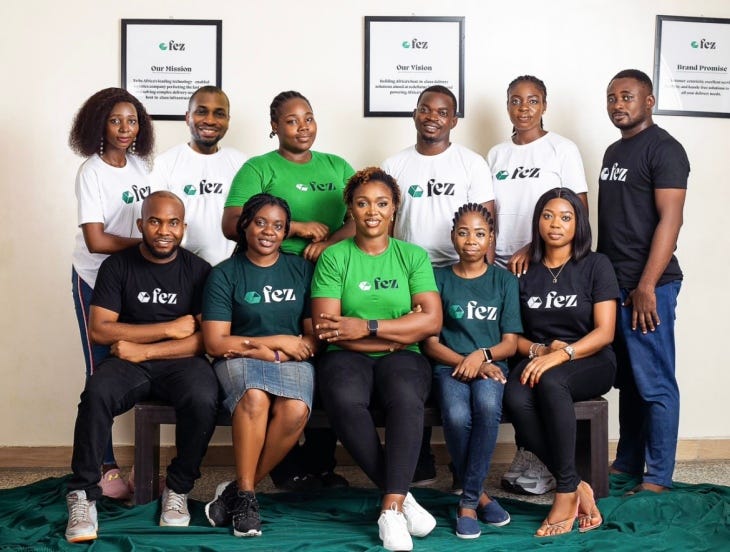A Lagos-based logistics startup, Fez Delivery, has successfully raised $1 million from Ventures Platform, a pan-African investor, along with Voltron Capital, Acasia Ventures, and other angel investors.
With hubs scattered throughout Nigeria, the company is planning to extend its reach in the $10 billion transport and logistics market of Nigeria, while also contemplating expansion into other African markets, including Ghana, Kenya, and South Africa by Q4 2023. The startup aims to invest its seed funding in upgrading its technology, streamlining its operations, increasing its marketing budget, and expanding its workforce.

Why The Investors Invested
Dotun Olowoporoku, General Partner at Ventures Platform, revealed that his firm made the decision to invest in Fez Delivery because of their innovative technology that allows other market players to flourish. Ventures Platform believes in supporting market-creating innovation in industries that are often overlooked, such as logistics. This alignment between the firm’s investment thesis and Fez Delivery’s vision is what drove Ventures Platform to back the Lagos-based logistics startup.
read also Healthtech Startup Zipline Authorized To Operate Remote Drone Delivery Services In Ivory Coast
“I’ve realized we can build and create solutions around payment and core fintech. But there are other problems within the ecosystem that no one is looking at, one of which is logistics,” noted Alley, who also had a brief stint at mobility fintech Moove, when asked why she was building in the logistics and delivery space instead of fintech, where she has several years of experience.
A Look At What The Startup Does
Seun Alley, Founder, and CEO of Fez Delivery, has an impressive background, with over ten years of experience in Nigeria’s banking sector and a string of successful startup ventures, including OPay and Bloc. In 2020, she founded Fez Delivery as a spin-off from a B2B janitorial service and a side hustle that she had launched two years earlier. While running the janitorial business, Alley received multiple complaints from her customers about the janitors’ work. Despite doing thorough cleaning in the morning, the janitors were often absent throughout the rest of the day, failing to carry out necessary touch-ups as required. This led her to create Fez Delivery, a company that is dedicated to ensuring prompt and efficient delivery of goods and services throughout Nigeria.
“We realized that this happened because the janitors went on lots of errands for our clients’ employees,” the chief executive said. “And the reason for this, we learned, was because most of the places they were buying stuff from did not have a dispatch or logistics service.”
The challenges faced by Nigerian businesses are widespread, as revealed by the market research conducted by Alley before launching Fez Delivery. She spoke to entrepreneurs and small business owners, both within and outside her circle, and discovered that talent and logistics were the top concerns. Despite being one of the fastest-growing industries in Nigeria, logistics remains one of its most fragmented. Even with the millions invested in startups, many have failed to create sustainable businesses. Last-mile delivery startups and small businesses often encounter pricing, reach, and delivery time issues. Fez Delivery’s solutions optimize for these features, according to Alley. Its mobile and web apps allow individual customers to access its services, track orders, manage expenses, collate data, and make payments. For business clients, the startup offers APIs and dashboards. Fez Delivery boasts over 17,000 customers on its platform, with 70% being individuals and 30% a combination of SMEs and startups.
read also Ghanaian B2B e-logistics Platform Jetstream Raises $13M In Pre-Series A Round
Last year, Fez Delivery expanded its offerings by launching FEZ for fintechs, a vertical that provides assistance to fintechs in delivering debit cards and POS terminals to customers and agents across Nigeria. To meet the increasing demand for its services, Fez Delivery recently created a SaaS platform to onboard and verify trained third-party two-wheeler logistics platforms with fleet sizes of about five to ten. These third-party partners share in the revenue generated by Fez Delivery, which charges individuals per delivery based on distance covered and item size, while businesses pay a monthly flat fee subscription based on a set range of deliveries. This new initiative has enabled Fez Delivery to fulfill more orders and expand its reach beyond its own fleet capabilities.
Fez Delivery reported completing 200,000 trips last year and achieving a 20% month-on-month revenue growth. Its impressive client list includes Flutterwave, Kuda Bank, Moniepoint, OPay, Red Bull, and Famasi Africa, as stated by the company.
Despite competition from Uber’s Uber Connect, Kwik Delivery, and Gokada, among other emerging players, the Techstars Toronto-backed platform distinguishes itself through its unique model. Unlike its competitors who operate solely on-demand, Fez Delivery combines the on-demand model with the hub and spoke model, according to Alley.
“We pick items from customers in bulk and take them to a central location where they’re zoned before assigning them to riders to complete,” the CEO commented. “So I like to refer to Fez as running a hybrid model. We have the technology and still own 30% of the assets on our platform. What that does is that if third-party partners don’t show up for any reason, we have backup and can complete our deliveries by ourselves. So for us, we think that gives us an edge because we also own a significant number of assets while also providing technology.”
Charles Rapulu Udoh

Charles Rapulu Udoh is a Lagos-based lawyer, who has several years of experience working in Africa’s burgeoning tech startup industry. He has closed multi-million dollar deals bordering on venture capital, private equity, intellectual property (trademark, patent or design, etc.), mergers and acquisitions, in countries such as in the Delaware, New York, UK, Singapore, British Virgin Islands, South Africa, Nigeria etc. He’s also a corporate governance and cross-border data privacy and tax expert.
As an award-winning writer and researcher, he is passionate about telling the African startup story, and is one of the continent’s pioneers in this regard
